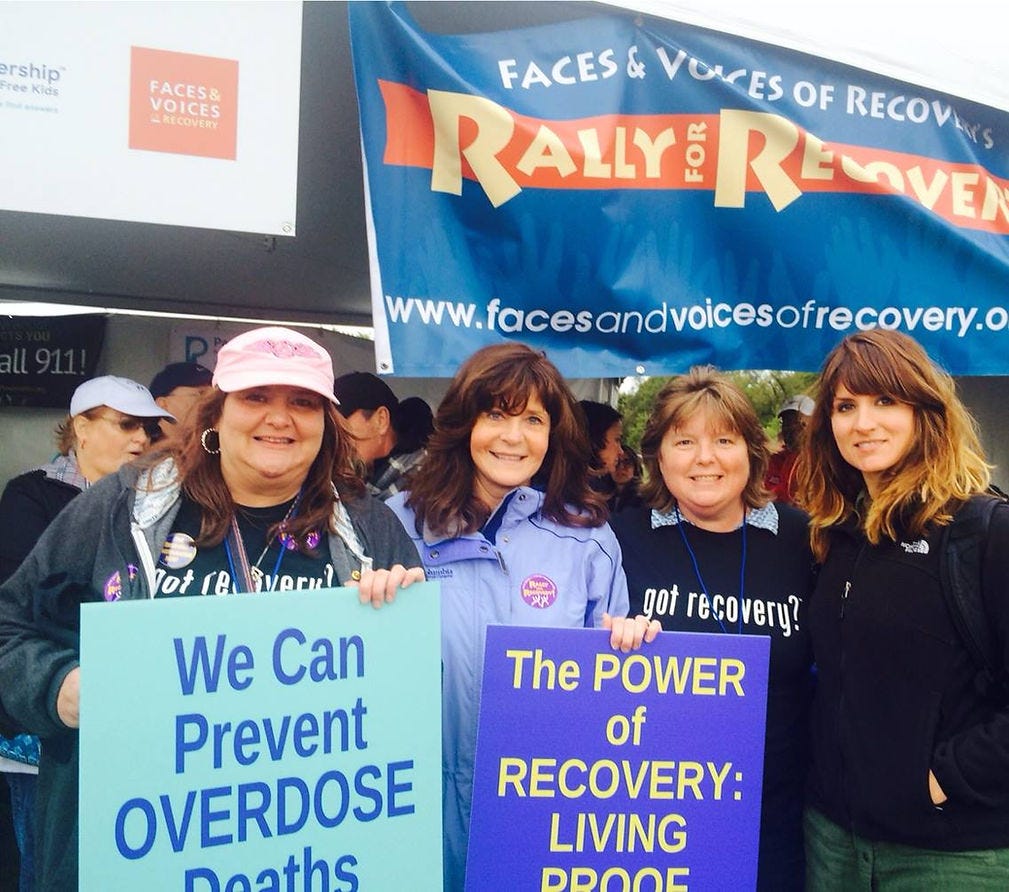The coffee shop was dimly lit and I stared at the half-empty latte in front of me. I was very early, even for me, needing to find the perfect spot so I could feel as comfortable as I could—something that I learned over time helped when I struggled with anxiety.
She walked in and instantly I knew it was her.
Florence’s eyes were strong, yet soft, a deep green that you could get lost in and at the same time, see yourself. She told me about the work that she did, teaching a class on substance use disorders and about the years of experience she had working with women with addiction and trauma histories—women like me.
Florence had a way (and still does) of teaching me something every time we met. This first meeting she taught me some things about recovery I hadn’t given much thought to.
“Did you know that the way that we talk about addiction matters? We don’t say ‘substance abuse’ anymore. The word abuse has such heavy, negative connotations. For some of us, it even triggers things. Especially for women in recovery. Or the word ‘dirty.’ Think about it. People talk about having ‘dirty urine’ when getting probation or parole screening. I hear the word ‘dirty’ and I think ‘bad.’ It’s like we’ve almost been conditioned, by the way we talk about it, to see addiction as something it’s not. A moral failing. A weakness. When it is a medical condition like diabetes, cancer, or heart disease.”
I’d learn that once she got going, Florence could talk for hours about the things she cares about.
This—this is what I want to learn more about, I remember thinking as she spoke about advocacy and told me about her own recovery journey.
Our stories were different in some ways, yet the same themes—pain, isolation and fear; then surrender, redemption and community—wove throughout. I drank in every word. She did most of the talking, but when I spoke, I could tell she was really listening. Really listening. I could tell that she heard me.
Supporting Our Stories
I told her that I was thinking about and struggling with going back to college and working in a women’s recovery home. She just nodded as I spoke about the research I’d done, learning about how there was a lack of affordable, safe housing for women leaving treatment and trying to maintain their recoveries.
I told her how hard it was for me, impossible in fact, to stay sober when I got out of treatment the first time and had to return right back to the same environment, same friends, same home where I had gotten sick. How I felt called to be part of a solution to a problem I was just starting to recognize.
Florence was one of the first women to swoop me up. She was someone who believed in me until I had the confidence and boldness to believe in myself. She was someone who really saw and understood that little girl sneaking beers from her grandfather’s fridge, the teen needing somewhere to go after treatment, and the young adult trying to find her sober life and purpose.

Someone to Help Us See the Truth
As a thirty-year-old in recovery and only a couple years sober at the time, I also had so much of what I’ll just call “feeling” bubbling up to the surface. Raw emotion. It felt like my skin dissolved, all of my organs exposed and pulsating for all the world to see. Everything was complicated and I knew I needed someone else to help me sort through it all. A Marie Kondo for my soul.
What I saw when I looked at my life and recovery looked like a Salvador Dalí painting: warped with dripping clocks and sad skylines. What Florence saw (and what she helped me to see) was the softness of my life: the sweet brush strokes and pastel impressions of a Monet—the beauty.
Not Alone in Our Stories
For so long, I felt like I was the only one to experience trauma, addiction, and loss. She helped me to see the truth that I was just one of many. Not a special snowflake, but part of an avalanche of struggle—and joy. This was a very comforting thought. If I was just one of many, this meant I was not alone.
I finally belonged.
Flo helped me to realize that my story didn’t—and doesn’t—exist in isolation. It is part of a shared recovery story that can be celebrated. Author Frederick Buechner in the Magnificent Defeat sums this up beautifully:
And the storyteller’s claim, I believe, is that life has meaning–that the things that happen to people happen not just by accident like leaves being blown off a tree by the wind, but that there is order and purpose deep down behind them or inside them and that they are leading us not just anywhere but somewhere. The power of stories is that they are telling us that life adds up somehow, that life itself is a like a story. And this grips us and fascinates us because of the feeling it gives us that if there is meaning in any life–in Hamlet’s, in Mary’s, in Christ’s–then there is meaning also in our lives.
May we all find the beauty in our collective stories and shared meaning in the friendships that carry us.







